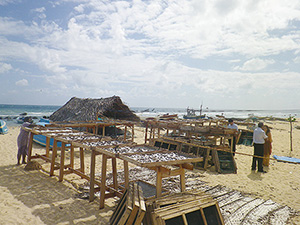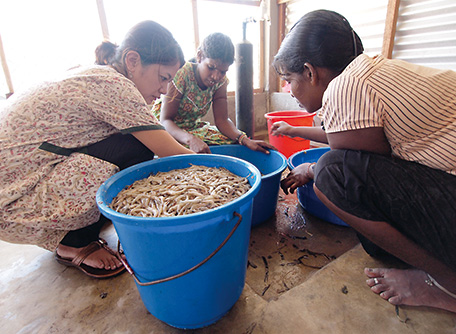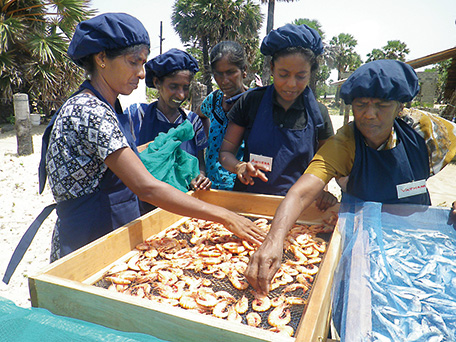Stories from the field 03
Dried fish business empowers women in Sri Lanka
– Support for women struggling against poverty in a Sri Lankan fishing village

Tools including wooden boxes provided by Japan for making dried fish. (Photo: Mitsuko Nishimori / PARCIC)
Jaffna District, a region in the northernmost part of Sri Lanka surrounded on three sides by the sea, has a robust fisheries industry. It is also a region that has seen a continued increase in the number of households with a widow. Many of the local women lost their husbands to Sri Lanka's prolonged civil war and the 2004 Indian Ocean Tsunami. According to data from 2010, there were approximately 40,000 widows in the northern part of the country alone. It goes against local traditions for a woman to fish in place of her husband. This means that job opportunities for these women are very limited, and as a consequence, many widows and their families are living in poverty. They often only manage to eke out meager existences by taking up jobs related to fishing, such as sorting caught fish and making dried fish out of small fry not fit for sale.
Support for full scale fish drying
In 2003, during a ceasefire from Sri Lanka's civil war, a survey of the area was started by the Pacific Asia Resource Center – Interpeople's Cooperation (PARCIC), a specified non-profit organization that focuses on international aid and the promotion of fair trade. They established an office in Jaffna in 2004 and began offering assistance to the widows living in the area. Dried fish has traditionally been part of the local diet in Sri Lanka. However due to problems in the manufacturing process, deficiencies such as residual sand or excess salt in the products are common. PARCIC decided to help widows learn how to make high quality dried fish for a full-scale business, with the goal of providing them with a reliable source of income. Just when the organization was about to start a project to that end, the Indian Ocean Tsunami hit. PARCIC continued its activities in Sri Lanka, and shifted its support towards assistance for the victims of the tsunami from 2005 onward. Sometime after that, the civil war again flared up and PARCIC was left with no choice but to withdraw from Sri Lanka. In 2010, after the conclusion of the civil war, PARCIC was finally able to return and fully begin its dried fish project. JICA supported the organization's work, enabling them to start “the Dried Fish Project for Women in Jaffna Fishing Community” as a JICA Partnership Program1. That project was to be conducted for three years from October 2010 to September 2013. Ms. Mitsuko Nishimori of PARCIC was sent to the site to work on the project and stayed there from December 2010 until the project was concluded.
“In this project, we supported widows through fish drying with the goal of improving their lives by creating a business that could provide them with a certain amount of regular income. Partly due to the teachings of Hinduism, the women of Jaffna District are raised to believe that women should be protected by men, so society does not expect girls to become economically independent, and many of them reach adulthood without ever making any money themselves. These women, raised in such a society, found themselves in a difficult position in which they needed to make money on their own to feed themselves and their children after losing their husbands or brothers during the civil war or tsunami.”
PARCIC invited a retired professional fisherman from Japan to train the women how to use sanitary methods to dry fish. PARCIC staff also organized the training to ensure product quality and develop new sales channels, in addition to lessons on basic bookkeeping. This project helped the women learn how to make high quality dried fish and handle products in a sanitary way. For example, people in the area used to place fish directly on the ground to dry leading to hygiene problems, so the project staff provided the women with wooden boxes made especially for fish drying. However, all of this is not to say that the project did not run into a number of difficulties.
The change in staff mindset
“The first issue we struggled with was the caste system. The caste system still remains deeply rooted, particularly in Jaffna District in Sri Lanka. People who are not from the fishermen's caste2 tend to refuse to do fishing or fishery work. Furthermore, many Hindus dislike the smell of fish and jobs that involve killing living things. A major challenge for the project was that the women hesitated to touch fish or help with the carrying and selling of dried goods themselves, even though the Sri Lankan PARCIC staff were willing to give them advice and instructions, making it difficult to develop sales channels. That is why, I, as a foreigner with no reservations about touching fish, stepped in. I began to accompany the women and staff when visiting prospective customers. My presence as a Japanese person also seemed to help assure buyers about our product quality, which helped us find new sales channels. As the business took off, the mindset of the staff about dried fish began to change. The Sri Lankan staff members began to act as intermediaries between the village women and the customers, and started to work actively to increase their business volume.”
Ms. Nishimori explained that by having experts come from Japan, a country with a thriving fisheries industry, to teach first-hand methods for the production of sanitary and high quality dried fish, and by instructing women on the overall business process, including production, sales, and securing profit channels, “The project was able to show a concrete way of earning a stable source of income to widows who had never been able to earn enough.” At the same time, “Women who previously had little to do with each other now work in groups. They talk with each other, help each other and are forming cooperative relationships. I think this is also a major achievement.”
Improving the lives of fishing village women

Ms. Nishimori (left) helping widowed women make dried fish. (Photo: Mitsuko Nishimori / PARCIC)
One woman who participated in the project was Anusha, a widow in her 20s who lives with her seven-year-old child. She commented:
“When I heard about the project from the village Fisherman Cooperative Society (FCS) I decided to participate, thinking it would be a good opportunity to earn my own income. They gave me the necessary tools, and money to buy fish in the beginning, so I was able to effortlessly start making dried fish. I found it especially helpful that a Japanese expert came here to show us first-hand how to make dried fish products. It really helped me learn sanitary drying methods. I also learned a lot from visiting the southern part of Sri Lanka where I took part in training for making dried bonito, and made a visit to a fish market in Colombo. Thanks to my participation in this project, I was able to earn a handsome income during the good fishing season and saved up enough money to purchase a plot of land. Next I want to try making dried goods other than bonito, and increase production so that I can give my son a good education.”
Another person who participated in the project was Bhanumathi, a woman in her 50s with three daughters, two of whom are currently living with her. When asked about the project, she replied, “I lost my husband 16 years ago, and a son and a daughter in the tsunami in 2004. I was doing jobs like fish drying in order to provide for my family by myself. I heard about this project when I was considering ways to increase my production of dried goods and grow sales. It was of course good to learn methods for producing dried fish products in a sanitary way, and I also found it useful to learn accounting skills and methods to calculate profit. I also thought it was helpful that PARCIC staff members came to see us regularly to check on how we were making products and that they supported us in our sales activities. The project helped me to develop an eye for dried fish, and to produce high quality goods myself, enabling me to sell my products for a slightly higher price than other people. This project really helped to improve the lives of women in the fishing village.”
Anesha, a staff member in her 30s working in the PARCIC office, had this to say about the project, “I think it was very meaningful that we were able to provide the women with all of the materials and tools they needed to start producing dried fish products, as well as build a processing factory where the women could gather for their work thanks to the Japanese support. I also think there was great significance in having Ms. Nishimori stay with us in Sri Lanka and run this operation for three years. I was really impressed to see how the Japanese people, including Ms. Nishimori, were always on time and how devoted they were to their jobs. In the future, we hope to continue supporting the women's lives not only through assisting dried fish business but also by cooperating with them in other efforts such as sales of recycled saris.”
The project has come to an end, but support to improve the lives of women continues. Ms. Nishimori looked back on the project, commenting:

Widowed women making dried fish. Materials such as wooden boxes were provided by Japan. (Photo: Mitsuko Nishimori / PARCIC)
“When I see with my own eyes that the women who participated in the project not only became able to earn an income but also gained confidence and started behaving in a more positive way, or even when I hear such news, I realize the achievement of the project. This was my first experience of living and working in a region affected by a civil war. It made me realize that living in the world with peace and freedom, something I used to take for granted, was actually a luxury. It is not just that people in the northern part of Sri Lanka cannot get the commodities they want – even the freedom of speech and lifestyles of women are limited. And given that, I could really feel how strong these women were to start working on their own, make money, and learn to stand on their own feet. I want everyone to know that these women, living in such a difficult place, have been supported by Japan's ODA. In countries that do not have social security systems like we have in the developed world, many rely on assistance from Japan and other developed countries to live. I hope that people will take an interest in situations overseas, such as the one in Sri Lanka, and participate in NGOs and other civic activities.”
*1 A program implemented by JICA as part of ODA to promote and foster the projects for local residents formulated by “partners in Japan” such as NGOs, universities, local governments and public interest corporations, who are willing to engage in international cooperation.
*2 Those in the group that do fishery work under the caste system.
<< Previous Page Next Page >>
Main Text | Statictics and Reference Materials | Stories from the field | Master Techniques, From Japan to the World - | ODA Topics
